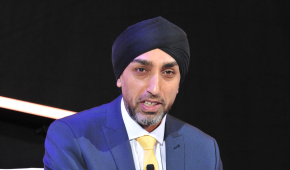One NHS Finance outlines next steps
The intention to bring the three workstreams under the ONF umbrella follows the publication of the final ONF report Becoming one NHS finance, which analyses the contributions of finance staff to two national conversations, held last autumn and in February this year. Overall, 3,200 finance staff contributed to both conversations, sharing their thoughts on how the finance function should be developed to make a difference for patients, improve the services offered by the function, and ensure NHS finance is an attractive career choice.
A five-year strategy encompassing the three programmes will be developed and is due to be launched in September.
The National Finance Academy will be set up with the mission of ensuring NHS finance staff have access to inclusive, comprehensive, and structured training and development schemes. It will provide a single point of entry for opportunities from all training providers, reducing confusion and duplication.
Already a familiar name, Future-Focused Finance will refocus its attention on building a sense of finance community through facilitating engagement and networking, including with clinical and other non-finance colleagues, sharing best practice, and ensuring NHS finance is a great place to work. FFF will also develop ways to promote NHS finance as a career choice to attract high-performing and diverse talent.
The Finance Innovation Forum will highlight new developments in NHS finance to promote greater efficiency. It will use expert groups, and harness patient-level data, technology, and innovations created in the NHS to support the delivery of better value health and care to patients and for taxpayers.
Hardev Virdee (pictured above), group chief finance officer at Barts Health NHS Trust, will chair the new academy as it develops a national curriculum ready for regional roll out. ‘The aim of the academy is to ensure all staff working at every grade feel supported and have opportunities available to help them progress their careers,’ he said. ‘Our priorities will focus on career progression, diversity and inclusion, recruitment and retention, and leadership development.’
Jenny Ehrhardt (pictured), group chief finance officer of Manchester University NHS Foundation Trust and chair of the new innovation forum said the forum’s goal would be to deliver ‘tangible and measurable outputs’, while aspiring to transform the whole function to be a ‘data-driven, strategic, engaging and innovative workforce’. 
‘The forum will be a platform of discovery for existing and emerging innovations in NHS finance,’ she said. ‘It will connect organisations and systems through sharing best practice and change current processes that compromise the strategic sustainability and agility of healthcare finance.’
Simon Worthington, director of finance at The Leeds Teaching Hospitals NHS Trust, will chair the FFF programme for the next two years.
The three programmes echo the points made by finance staff during the ONF conversations. The final report said contributors called for structured finance training. Skills development should include opportunities for lower grades to access training to allow them to progress their careers. A greater emphasis should be placed on the development of soft skills in tandem with technical and professional development.
Many participants called for greater flexibility in where and how they work, including secondments and opportunities to step up. There should be a greater focus on diversity and inclusion, with senior staff offering leadership, they added.
Just over a quarter of contributions to both conversations were on developing systems and processes. Staff were clear the NHS should use in-house talent rather than external firms to deliver projects and improve processes.
One contributor said: ‘I’m always amazed by the range and scope of organisational challenges in the NHS that finance skills could make a direct impact on. Two immediate examples are process improvement and workforce planning, but there will be loads more. Finance should sell itself as an internal consultant/PMO with teeth.’
There was some frustration that the NHS does not always share innovations internally to avoid the need to ‘reinvent the wheel’. The finance function could make greater use of the data it collects and technology such as robotic process automation. There was a role for standardisation to save time and money. Suggestions included common templates for core tasks including costings and business cases, investment opportunities, and year-end accounts.
Finance managers called for organisations to be able to look beyond the end of each financial year to allow the adoption of long-term innovations and value for money strategies. Others said a focus on value improvement programmes rather than cost improvement plans would improve how non-financial colleagues view finance, and allow finance staff to see how their work links to patient care.
While participants showed great pride in working for NHS finance, and they wished to promote finance careers to entrants at all levels with benefits including flexible working and support while studying. Developing the finance community also meant supporting the wellbeing of existing staff, but there was also a desire to step out of the back-office to demonstrate the integral nature of the function to the NHS.
Related content
We are excited to bring you a fun packed Eastern Branch Conference in 2025 over three days.
This event is for those that will benefit from an overview of costing in the NHS or those new to costing and will cover why we cost and the processes.